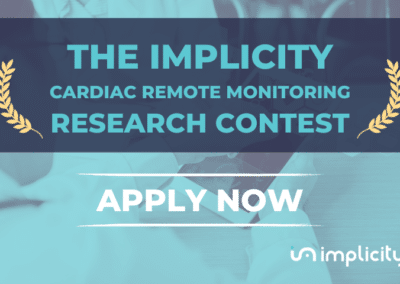Clinical and academic researchers can apply for one of three spots for free access to cardiac remote monitoring and ILR ECG Analyzer to support CRM research
Cambridge, Mass., March 10th, 2022 – Implicity, a leader in AI-powered remote patient monitoring and cardiac data management solutions, today announced an invitation for US-based researchers who are looking to conduct a study in the field of Cardiac Rhythm Management to apply for free access to Implicity’s cardiac remote monitoring software, including the ILR ECG Analyzer* & Advanced Research Tool. This is an opportunity for investigators to use highly-intelligent cardiac remote care & research solutions to support their studies for a minimum of one year, with support from Implicity’s team of data scientists and engineers.
“Research is at the heart of what we do at Implicity. Our solution is already the official remote monitoring platform of one of the largest research consortiums in Europe, our goal now is to support academic medical centers, physicians, and researchers in the US as we look to improve the treatment and diagnosis of cardiovascular diseases. We are excited to host this unique research competition, provide study support through our device-agnostic platform, and learn of the findings from these studies,” said Dr. Arnaud Rosier, CEO, and founder of Implicity.
Cardiac remote monitoring has already been shown to reduce the number of unnecessary emergency department visits and improve the time to diagnose clinical events. As the adoption of RM continues to grow, more studies will be needed to measure the ongoing impact of emerging technologies and new applications. From managing patient data content forms to organizing cross-device data, the Implicity platform is an effective tool that researchers can use to drive more efficient operations while also enabling scale.
Implicity’s research competition is open to physicians, medical interns, physician groups, academic facilities, PhDs, PhD students or other allied health professionals based in the United States, leading studies that involve remote monitoring data from cardiac implantable electronic devices (CIEDs), ILR ECG analysis, or other areas related to cardiac remote monitoring.
The deadline to apply is Tuesday May 10th, 2022. A panel of industry judges will make decisions shortly thereafter – the panel includes Prof. Jagmeet Singh (Boston, MA), Prof. Niraj Varma (Cleveland, OH/London, ENG) and Dr. Suneet Mittal (Paramus, NJ/New York City, NY).
Winners receive free access to Implicity’s AI-powered Cardiac Remote Monitoring platform and features, including the ILR ECG Analyzer and the Advanced Research Tool module, for a minimum of 12 months.
For application instructions and proposal requirements, visit: https://www.implicity.com/landing-page/research_contest/ or reach out directly to Implicity at researchcontest@implicity.com
About Implicity
Implicity provides an AI-powered remote monitoring and research platform used by Independent Diagnostic Testing Facilities and cardiac electrophysiology centers worldwide to deliver advanced high-quality care for their patients with connected CIEDs. On this platform, Implicity aggregates, normalizes and standardizes data from any implantable cardiac device across all manufacturers. Furthermore, Implicity carries out R&D on AI-based algorithms aiming at improving patient care and serving the future of preventive medicine. Implicity is the first private company authorized to access the Health Data Hub**, one of largest databases of patients with heart diseases in the world, supporting the development of its ground-breaking AI solutions. Implicity covers 70,000 patients in over 100 medical facilities across Europe and the United States.
* FDA cleared Class II medical device and CE marked Class I (under MDD) medical device, see the instructions for use for more information.
** Health Data Hub is a health data platform put in place by the French government to combine existing health patient databases and facilitate their usage for research and development purposes.

